Better Environment, Better Livelihood
By special correspondent DUAN HAIWANG
DING Wenguang is a professor and doctoral supervisor at the School of Earth and Environmental Science of Lanzhou University. He is considered an interdisciplinary scholar across the three realms of education, public welfare, and consultation. Having studied at Simon Fraser University in Canada, Ding also worked for several years in an international NGO. In 2008 Ding used the RMB 200,000 bonus he had been awarded for his scientific research to establish the Gansu Yishan Yishui Center for Environmental and Social Development (Yishan Yishui).
Influential Non-governmental Think Tank
Scientific decision-making and the social demand for a more open market place have spurred a proliferation of non-governmental think tanks.
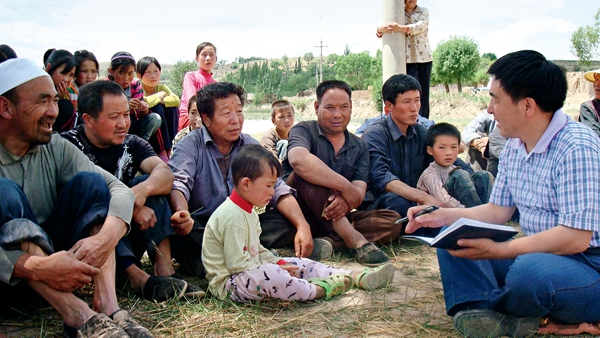
Ding Wenguang (first right) discusses with impoverished farmers how to enhance poverty-relief projects.
Yishan Yishui leads this trend by virtue of its multifaceted studies on comprehensive community development, public policy, and relevant theories. In recent years the center has become an influential non-governmental think tank. Its focus is on providing a scientific basis for government decision-making, raising successful examples of community development schemes, and supporting theoretical research with concrete evidence. In November 2015, the National Federation of Social Sciences Circles commended the center on its contributions to building a new type of think tank.
A veteran of global development program management, Ding contributes his ideas and efforts towards strategic planning, consultation on domestic and international development agencies, and non-governmental organization (NGO) capacity building. The State Ethnic Affairs Commission of China and the United Nations Development Programme (UNDP) have invited him to contribute his expertise to the UNDP’s China Culture and Development Partnership Framework. He has also been engaged in the monitoring and evaluation of World Bank sustainable agriculture projects, and in the preservation and development of cultural heritage. The Asian Development Bank has moreover invited Ding’s input on social development issues.
Ding and his team have made significant poverty alleviation achievements in Gansu Province. And in the process the provincial government has gained valuable experience in implementing poverty relief projects that encompass every village and household. Ding has also raised several proposals to the provincial government on naturals reserve management, law enforcement, and supervisory mechanisms, among others. These have been adopted by relevant administrations with a view to improving governmental work strategies. In addition to all that, Ding is calling for enhanced public participation, especially from women, in legislation and public policy making. This proposal has received high commendation from the Legislative Affairs Commission of Gansu Provincial People’s Congress and UN Women. Furthermore, Ding’s evaluation of the impact of high-speed railways on grassland ecology in the Hexi Corridor has aroused wide concerns among the public and government officials alike. This appraisal has prompted modifications to the construction of high-speed railways in the province in efforts to preserve its ecological environment.
Poverty Alleviation Endeavor
Promoting community development through industrial projects is another Yishan Yishui mission. The center has expended considerable efforts on economic and social progress and environmental protection in China’s western regions.
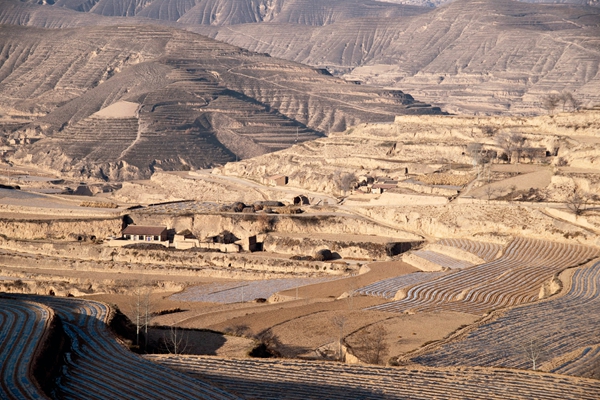
Ding has observed that NGOs in China seldom launch rural community development projects. In some ways this is understandable, as projects of this kind present a challenge in requiring substantial and sustained contributions to poor rural areas. Ding and his team have nevertheless concentrated their energies in this field for 10 or more years.
Since returning from Canada, Ding has paid close attention to progress in poor rural areas of Gansu Province. Having grown up in a poverty-stricken village, Ding knows all too well the misery of being poor. Meantime, his accumulated research over the years has expanded his understanding of the poverty issue. Based on his study and practice in 50 or more international programs on ecological and disaster management and poverty relief, Ding initiated the “disaster risk management – ecological rehabilitation – livelihood improvement” model; and also that of “cognition – mitigation – adaptation to climate change.” Both fit the actual circumstances in China’s arid and semi-arid regions.
“Our research has shown a link between poverty and environmental degradation as a cause of frequent natural disasters which, in turn, worsen poverty,” Ding said. On the basis of their findings, Ding and his team have developed a guideline on facilitating community development. It entails making comprehensive plans that include poverty alleviation, environmental protection, disaster management, capacity building of rural communities, and systematically enhancing these sectors. Its aim to lift more people out of poverty, Yishan Yishui thus not only “transfuses” but also “makes” blood for poor areas. Developing profitable industrial projects and providing financial support are the main methods of making the “blood” that will enable Yishan Yishui to realize sustainable development of the community’s economy. The center has raised funds through various government-sponsored programs that help poor areas initiate poverty relief projects.
Since 2012, Yishan Yishui has gained funds from the demonstration project to support social organizations through the central government budget for three successive years. Jointly launched by the Ministry of Finance and the Ministry of Civil Affairs, the project is the country’s first scheme encouraging government purchases of social services from social organizations. Yishan Yishui drew on funds it had received totaling RMB 1.3 million to support needy groups and development projects. Over this three-year period, more than 1,300 impoverished farmers in three townships of Pingliang City, Gansu Province have doubled their incomes. At the same time, projects to restore the local ecological system have been carried out. For instance, the planting of fuelwood forests and grass has turned barren hills green, and at the same time controlled water and soil erosion.
Through making full use of his accumulated experience and resources gained from managing international development projects, Ding has raised more than RMB 150 million from other social organizations, including the Shih Wingching Foundation and Kadoorie Charitable Foundation. He has used these funds to construct infrastructure such as roads, village health clinics, and potable water systems. His contributions have benefited over 20,000 local residents, and also lent new impetus to provincial poverty alleviation plans.
Some farmers in poor areas of the province are illiterate and find learning new technologies a challenge. Yishan Yishui has consequently focused on training for local people and prioritized the capacity building of rural communities. Yishan Yishui team members organize activities like dramas, competitions, and prize distribution to encourage locals to take part in these training courses. So far, around 65,000 farmers in Gansu Province have taken part. They have thus expanded their knowledge of new technologies and ability to enhance productivity. Younger farmers can also obtain the latest agricultural information through their smart phone apps.
Rotational Beef Cattle Breeding
To deal with the adverse natural conditions in China’s arid and semi-arid regions, Yishan Yishui has initiated a new poverty-relief model – rotational beef cattle breeding.
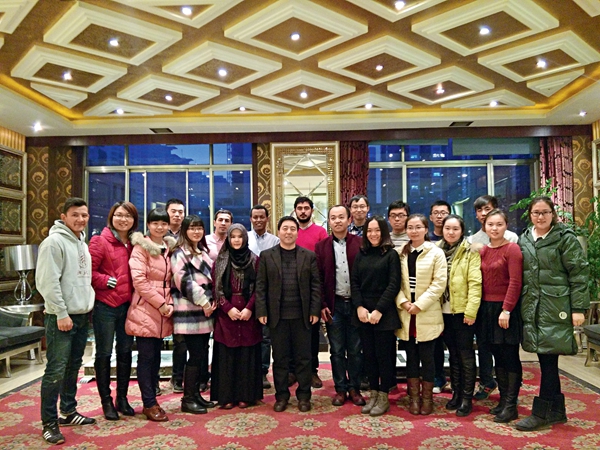
In acknowledgment of the benefits of participatory development as espoused by its global counterparts, Yishan Yishui encourages local residents to select poverty-relief projects and bring in management systems according to their own wishes. To maximize fund efficacy, beneficiaries are divided into two or three batches. The neediest households get a cow first. After they have calved, the cows are moved on to the next batch. In this way one cow may benefit two or three households, so doubling or tripling fund efficiency. Farmers supervise and approve the entire rotation process and order. Transparent management reduces conflicts and promotes harmonious community development.
Affiliated ecological restoration plans are carried out at the same time. Each household funded is required to plant at least 0.13 hectares of fuelwood forest and at least 0.13 hectares of alfalfa. In this way, one cow may generate profits for three households and at the same time improve the natural environment over at least 0.8 hectares. More importantly, the center advocates mutual help, so motivating locals not to be passive or overly reliant on subsidies, or constantly expect aid. This victim-like attitude is one reason why poverty has prevailed in poor areas.
The rotational beef cattle breeding model has brought encouraging results. In 2014, the Ministry of Environmental Protection and the State Council’s Poverty Alleviation and Development Office invited Ding to a seminar in Beijing to share his successful experience. The team has continued to explore and innovate. “We have also developed a micro- loan scheme to help the poor in rural areas,” Ding said.
Yishan Yishui advocates infusing environmental awareness into poverty relief programs. In addition to developing affiliated ecological restoration plans, the center shares its national-patent technology free of charge with farmers involved in poverty alleviation projects. The technology, which is included in the Ministry of Science and Technology of China Applicable Technology Manual: South-South Cooperation on Science and Technology to Address Climate Change, improves methane tanks in such a way as to increase their gas production while reducing carbon dioxide emissions. It also guarantees gas production at low winter temperatures. Widely introduced to other developing countries during the UN Climate Change Conferences in Cancun and Durban, this technology has earned China considerable commendation.
Moreover, the center provides free clean energy facilities, including solar cookers, solar water heaters, and energy-saving stoves to participants in its poverty relief projects. Yishan Yishui is determined to go all out in promoting the country’s capability to tackle climate change.
Devotion to Public Welfare
The year Yishan Yishui was founded also marked the advent of non-government public welfare organizations in China. Yishan Yishui takes the lead in northwestern China as a professional philanthropic organization catalyzed by social and market transformation. It strives to connect with its counterparts in the region so that they may grow together and improve the social public welfare environment.
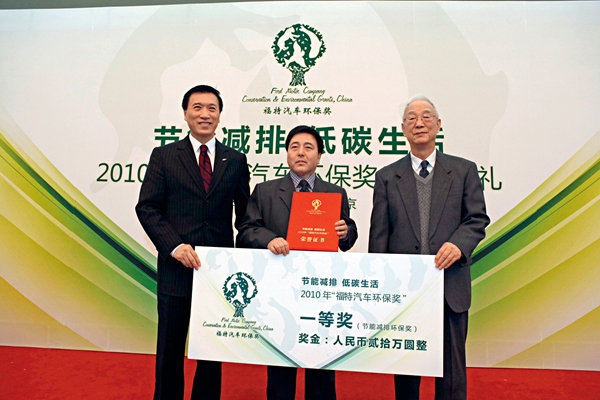
Yishan Yishui workers have always been quick off the mark at times of natural disasters. For instance, the center immediately coordinated with volunteers and other NGOs in dispatching rescue teams and relief material to disaster-stricken regions after the 2008 Wen-chuan earthquake, the 2013 Ya’an earthquake, and the 2013 Dingxi earthquake.
As a landlocked area in northwestern China, Gansu lags behind others in public welfare management. A leading organization in this region, Yishan Yishui has made remarkable contributions to the development of local public welfare by creating platforms, establishing mechanisms, and training professionals.
Public welfare organizations in the province have developed rapidly since the 2013 earthquake in Minxian County of Gansu Province in 2013. This is apparent in the establishment of the Gansu Non-profitable Welfare Relief Alliance, which was mainly initiated by Yishan Yishui. The alliance’s regulations, structures and strategies have been steadily improved in recent years. As its members become more diversified, the alliance is no longer limited to disaster relief. Rather, it has expanded to include education and environmental protection. Today, it is known as the Gansu Non-profitable Welfare Network Alliance, and cooperates with 87 organizations, benefiting 13 cities and prefectures in the province. Since connecting public welfare organizations in Gansu Province into a network in 2012, Yishan Yishui has laid great store on cooperation with governments and the capacity building of its counterparts. It has frequently organized diverse personnel training courses – from large-scale lectures to tailor-made tutorials.
Helping other organizations with strategic planning is another of Yishan-yishui’s commitments. Training courses that Yishan Yishui has provided on such skills as project management, monitoring, and evaluation, have boosted the alliance members’ capacity building. Non-profit gatherings have facilitated the comparing of notes among NGOs in the province. Furthermore, the center has joined in a provincial program that, in collaboration with 20 NGOs, will incubate a group of 20 grass-roots public welfare organizations and build up 30 nascent NGOs. By making a platform to exchange ideas and share resources, the program aims at promoting cooperation among NGOs in various fields, and further fostering the fair development of every community. Yishan Yishui has also launched a scheme to provide small grants to developing organizations as part of the program. On top of that, it has initiated a competition to select and sponsor outstanding innovative projects dedicated to public welfare. According to One Foundation, China’s first non-governmental foundation, the public welfare network in Gansu is the most stable and has the best administration among the dozens of province-level organizations it has worked with.
Global Partnership
In addition to the country’s government sectors such as the Ministry of Civil Affairs, the Ministry of Finance, and the Department of Gansu Provincial Civil Affairs, Yishan Yishui has also cooperated with a good number of organizations worldwide, including the World Bank, Asian Development Bank, UNDP, Global Environment Facility, China Foundation for Poverty Alleviation, Hong Kong Kadoorie Charitable Foundation, Hong Kong Shih Wingching Foundation, MISEREOR of Germany, Save the Children, One Foundation, and SEE Foundation, to name but a few.
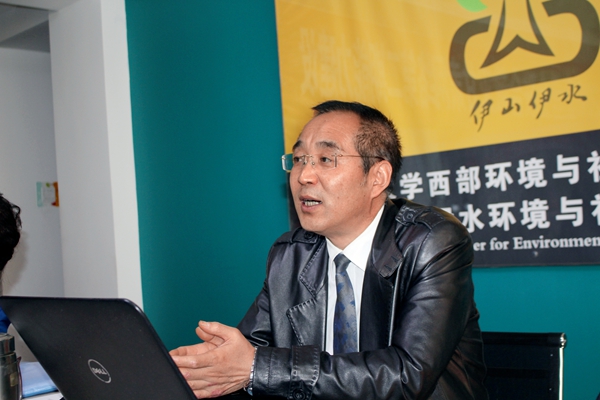
“Public welfare calls for professional attitudes and qualities,” Ding said. He took disaster relief as an example: “Culture and gender awareness are emphasized when we provide aid.” The Vice Chairman of Gansu Province Charity Federation went on: “For instance, we must be aware that ethnic groups like the Hui and Tibetans have specific diets. And the special needs of female victims must not be overlooked. What’s more, rescue teams should follow a unified command and carry out relief work in good order. The good attributes of traditional Chinese culture should be carried forward during disaster relief work.” Ding also pointed out that a charitable organization must devote considerable time, work and perseverance to fulfilling its commitment.
Statistics reveal the impressive development of Yishan Yishui. Established in January 2008, its full-time staff has expanded from one to 15, part-time think tank researchers now number 53, while volunteers surpass 1,000. So far, the center has raised over RMB 100 million to carry out more than 300 programs cooperating with 20 plus organizations at home and abroad. Ding remarked, however, that this has not been an entirely smooth process. But whenever challenged by difficulties or perplexed, Ding and his team nevertheless carry on, because they believe that the advancement of NGOs plays an important role in a harmonious society.
Since ancient times, Gansu has been a transportation hub for Eurasia, and was also an obligatory stop along the time-honored Silk Road. Yishan Yishui has carried out further studies with the aim of benefiting more people through full use of the Belt and Road Initiative (which encompasses the Silk Road Economic Belt and the 21st-Century Maritime Silk Road.) “The clean energy and dry farming technologies we have managed and our experience gained in disaster relief and fostering non-profit organizations can be introduced to more countries and regions along the routes. Meantime, we are looking forward to exchanging ideas with peers from these areas in such fields as policy and technology consultation and project evaluation,” Ding said.
- Belt and Road Brings Numerous Opportunities to Europe – An interview with Dr. Thomas Wagner, President of Gesellschaft Schweiz-China
- Belt and Road Initiative Injects New Vitality into China-Nepal Cooperation
- U.S. Departure from Paris Agreement Cannot Stop Low-carbon Trend
- Protecting People from Natural Disasters
- Rural Chinese Girl Speaks to the World
